Espresso is an indispensable drink for coffee lovers in the morning. After all, thanks to a cup of strong coffee, the body is activated. It is for this process that it is used. Caffeine and other components of the drink also affect the functioning of internal organs, in particular the gastrointestinal tract. Unfortunately, the effect of coffee on the stomach, pancreas, and intestines is not always favorable. For patients with gastritis or ulcers, it is better not to drink espresso, especially on an empty stomach. Such patients should avoid drinking natural coffee beans and instant coffee. More details below.
How to drink coffee in the morning without harm to your health
The daily intake of caffeine is 300 mg. This amount does not harm the body, which means you can drink up to two cups. This applies to a natural drink. Instant contains less caffeine - up to 200 mg. Anything that exceeds this norm is harmful. According to researchers, the ideal time for the first cup is 10 am.
If patience does not allow you to wait, for example, because you get up early, there is just time to have something to eat, and you can no longer drink coffee on an empty stomach. Even if you follow the norm, but continue to consume it on an empty stomach, this will not save you from problems with the digestive system. Fortunately, there are a couple of useful tips on how to drink a cup of aromatic coffee, wake up, invigorate, and at the same time not harm your health.
To turn coffee into a healthy drink, you need to drink exclusively freshly brewed drink from natural beans. You should not buy coffee made in a coffee machine or drink instant powder. The content of natural components in it is minimal. To maintain a healthy intestine, you should add a little milk. Drink a glass of water after each drink to restore fluid levels in the body.
Coffee in the morning is a common “ritual” for starting a new day, lifting your mood and cheerfulness. In the morning and throughout the day, the body will remain in good condition if you follow the tips and simple rules for drinking the aromatic drink.
Even if you are on a diet, you should have breakfast before drinking a cup of green coffee. After a snack, you can safely enjoy a drink without forgetting about your daily caffeine intake. As a result, it will not cause any harm to the body.
Coffee does not directly harm the intestines, but it does reduce the intestines' ability to absorb minerals such as magnesium, calcium, zinc and iron.
Here is a basic list of the properties of these nutrients:
• Magnesium – participates in maintaining the normal function of the nervous system and heart muscles, promotes intestinal motor activity;
• Calcium is necessary for strong bones and for the body cells to obtain essential nutrients;
• Zinc – fuel of the immune system;
How does coffee affect the stomach: benefit or harm?
There are many opinions regarding the effect on the gastrointestinal tract, both good and bad. Some people believe that coffee has a beneficial effect on the digestive system, as it promotes the absorption of food. Others are of the opinion that caffeine helps in the process of losing weight, prevents a number of diseases, and even reduces the risk of cancer. The drink improves the functioning of the cardiovascular system.
The liquid is most active in the stomach. Regarding the negative impact on this organ, the opinions of scientists are divided. Some believe that the coffee drink is only dangerous on an empty stomach, while others are confident that the negative impact of the drink does not depend on any factors. There is an opinion that, on the contrary, it has a positive effect on the stomach.
The drink contains not only caffeine, but also chrogenic acid. This substance makes the hostile environment in the organ more acidic, which can cause heartburn. This acidic substance irritates the lining of the stomach, so the drink should not be drunk on an empty stomach, especially if you do not eat anything afterwards. Because if the acid cannot digest anything, it begins to destroy the walls of the organ. This may cause pain.
The development of gastritis is possible if you regularly drink coffee on an empty stomach.
If you drink coffee for a long time on an empty stomach, it can cause gastritis, peptic ulcers, which can turn into cancer. The safest varieties are those that do not contain N-alkol-5-hydroxytryptamide, catechol or caffeine.
The most negative effect of coffee on the digestive system is in women under 35 years of age who drink it frequently. It has been proven that the effect of this drink directly depends on the variety and quality of the grains. Some varieties, on the contrary, block the production of hydrochloric acid.
Return to contents
How can coffee affect the digestive canal?
Before drinking your instant coffee or any other coffee drink, it is worth knowing some facts that will explain how coffee affects your intestines.
Effect of coffee on the stomach
Let's look at the physiological mechanisms of coffee's effect on the gastric mucosa.
- Like any liquid with a high temperature, coffee irritates the mucous membrane of the gastrointestinal tract. The phenomenon leads to increased secretion of hydrochloric acid and mucus in the stomach.
- In addition to the physical effects of temperature, coffee acts on the mucous membranes through chemical components. The catechol and caffeine contained in the drink enhance the production of hydrochloric acid.
- Physiologically, the mechanism of the stomach: during the night the organ is freed from food masses, then rests. If a person drinks a cup of coffee on an empty stomach in the morning, such a ritual has an irritating effect on the gastric mucosa and stimulates the production of hydrochloric acid.
- If a person has breakfast at the same time, hydrochloric acid is used to process the food bolus. If, besides coffee, no other food enters the stomach, hydrochloric acid has no choice: the substance digests its own stomach wall. It is extremely harmful to drink an invigorating drink on an empty stomach.
The effects of coffee with added milk on a sore stomach
Experts consider instant coffee to be the most dangerous for gastritis and stomach ulcers. The negative impact of the drink on the functioning of the gastrointestinal tract has been confirmed by research. The composition of the drink includes many tannins that can cause the following symptoms:
- heartburn;
- nausea;
- feeling of heaviness in the stomach.

Most nutritionists recommend drinking coffee by adding natural milk. The latter can be replaced with cream. Such a drink will be more gentle on the stomach, causing less harm.
Positive Action
Unique grains were highly valued in Asian countries, where they received their recognition and love. Did our ancestors know that coffee has a beneficial effect on the intestines? Today experts are convinced of the benefits of the drink.

Antimicrobial and anti-inflammatory effect
The positive effect of the aromatic liquid occurs due to its antioxidant properties. It is these qualities, which are no less than in vegetables, fruits or green tea, that will help overcome spring vitamin deficiency and strengthen protective functions during the cold season.
As a laxative
Many patients use this tasty drug for constipation. It is useful to take it as a cleansing before a diagnostic operation - colonoscopy. You just need to take into account that the effect of coffee as a laxative will be immediate, stimulating the emptying of the intestines and stomach, so undigested food will quickly enter the small intestine. Thus, not all the nutrients from this food are used by the body.
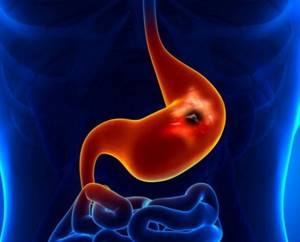
With prolonged absence of stool
Espresso, latte, cappuccino - any of these drinks will undoubtedly make bowel movements easier. To avoid negative consequences, follow the rules:
- Drink no more than two cups of coffee per day.
- If you have constipation, you can drink the drink an hour after meals.
- A glass of water would be helpful. In this way, acid plaque will be washed off from the teeth and the excreted fluid will be replenished.
- Coffee for constipation has an irritating effect on the mucous membrane.
Barley coffee as an alternative to natural coffee
When deciding whether to drink coffee if you have gastritis, think about the alternatives. A hundred years ago, Soviet researchers conducted a series of experiments with drinks based on barley grain. As it turned out, a drink made from barley has a general strengthening effect and is useful for people exposed to stress and physical activity. Barley coffee is introduced into the diet for recovery after severe infectious diseases, injuries and operations.

Effect on digestion
Barley and barley products are an indispensable component of therapeutic nutrition for a number of diseases of the gastrointestinal tract. The product is useful for biliary dyskinesia, dysbiosis, pancreatitis.
Biological substances in barley grains cleanse the intestinal cavity and restore the mucous membrane of the digestive canal. The cereal has a choleretic effect.
The complex high-molecular carbohydrates contained in barley grains act as a nutrient medium for the development of normal intestinal microflora. Barley has a beneficial effect on dysbacteriosis and improves immunity.
Antimicrobial and anti-inflammatory effects
The biologically active components of barley grain have a pronounced antimicrobial effect and help relieve the inflammatory process. Cereals and drinks based on them have a similar property in the complex treatment of intestinal and stomach infections.
It is healthier to replace the coffee drink with a barley or chicory-based one.
Negative effects of coffee on the stomach
Let's look at the harm and some of the consequences of drinking coffee drinks on an empty stomach.
Dehydration
A cup in the morning on an empty stomach increases the release of fluid from the body. The body begins to sweat heavily. In addition, the drink is a diuretic. To avoid dehydration, it is advisable to get into the habit of drinking a glass of water before coffee.
It’s surprising that most people, feeling dehydrated or thirsty, go to brew another portion of the drink. Instead of drinking a mug of water, thereby only worsening the situation.
High stomach acidity
If you drink coffee every morning on an empty stomach, you can get the expected health problems. Some criticize the caffeine, but drinking coffee without it does not avoid the consequences either. Caffeine and other plant-based compounds stimulate stomach cells to release more hydrochloric acid, which can sometimes aid digestion.
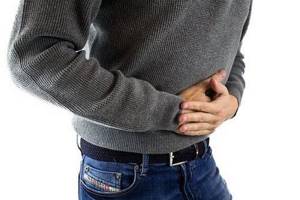
But drinking coffee regularly, especially on an empty stomach, reduces the amount of acid it contains, which is needed to digest foods later. This is also unsafe, because the gepirol bacterium, which is responsible for ulcers in our stomach, also prefers an acidic environment. Combine this with the fact that coffee weakens the stomach's protective barrier—the protective layer on the mucous membranes—and the risk of damage and ulcers increases.
Loss of appetite
Many may have noticed that coffee lovers in the morning rarely have breakfast. This is because it dulls the feeling of hunger. There are even so-called “coffee diets” for those who want to lose weight. Despite the good effect, every body still needs a good breakfast. With this regime, you will not be able to lose excess weight.
Rather, on the contrary, trying to make up for the lack of food in the second half of the day will gradually lead to excess weight gain. It is advisable to eat solid food before drinking coffee.
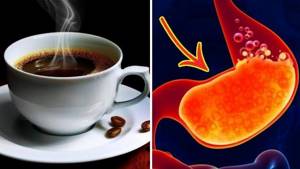
Causes acid reflux
If you drink large amounts of coffee, you can also get heartburn and acid reflux. Coffee relaxes the muscle valve in the esophagus, causing stomach acid to rise up the passage and cause heartburn. If this happens often enough, it can lead to complications, such as ulcers. “Acid release” from the stomach occurs due to the relaxation of the sphincter, which protects the esophagus from food and hydrochloric acid entering back. Caffeine contributes to this condition, which negatively affects the mucous membranes and leads to heartburn.
Increases the chance of food putrefaction in the intestines
When drinking coffee, acidity decreases, which leads to stagnation of food in the intestines. Food that is not completely digested remains in the intestine and gradually begins to fester. This process creates a toxic environment that encourages “bad” bacteria to immediately begin to spread throughout the intestines, damaging the intestinal walls and leading to inflammation.
Diarrhea
Loose stools are the result of the irritating effect of an invigorating drink on the intestines. This is a kind of protective reaction of the body that occurs with excessive consumption of aromatic liquid.
The effect of coffee on the pancreas
The pancreas is an organ that produces digestive enzymes and hormones. It performs exocrine and intrasecretory work in the body. The pancreas needs to be given special attention. Let's consider the question of how coffee affects the pancreas.
If a person does not have pathologies of this organ, then espresso will not harm health in any way. After all, the product contains components that enhance the functioning of the body’s digestive systems. The process facilitates the recycling of products.
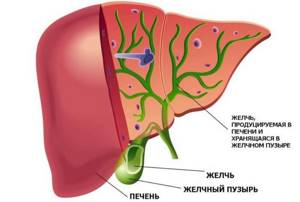
When drinking espresso on an empty stomach, the gland begins to produce enzymes to digest food. And they have nothing to synthesize and break down, because there is no food in the stomach. Therefore, enzymes begin to have a destructive effect on the walls of the digestive tract. As a result, health problems arise. Inflammation occurs not only of the pancreas, but of all gastrointestinal organs.
During an exacerbation of pancreatitis, give up strong coffee and do not drink instant drinks.
Coffee contraindications
Since coffee has harmful properties, it has a number of contraindications. People who have gallstones should not drink coffee. It is worth noting that coffee itself does not provoke them, but if they are present, negative effects are possible. Thus, excessive consumption of coffee increases the content of calcium, citrates, magnesium, and other substances in the urine that are part of the stones that form.
You also need to pay attention to how you feel when drinking coffee. If you experience unpleasant consequences, then you need to reduce the amount or give up this drink altogether.
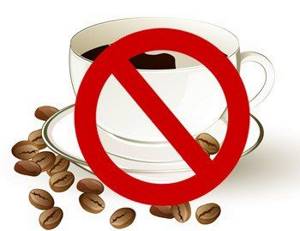
Cocoa - a coffee substitute for those suffering from ulcers and gastritis
It is not easy to deny yourself coffee completely, even with serious stomach problems. It’s much easier to do this if you have a tasty and, most importantly, safe analogue in mind. Cocoa can claim its place - rich and aromatic.
Diagnoses of gastritis or an ulcer create certain limits in the preparation of a diet. As a rule, chocolate is strictly prohibited in such cases. This means that cocoa can replace not only your favorite coffee, but also chocolate.

The drink has a bright chocolate taste, invigorates and charges you with a good mood. It includes:
- starch;
- polysaccharides;
- organic acids;
- tannins.
Patients with gastritis and stomach ulcers can drink cocoa in the same way as chicory in limited quantities, at the right time with the addition of milk. You need to choose only natural cocoa that needs brewing, and not its instant analogues with a high content of flavors and dyes.
You may be interested in Coffee and a cigarette: more dangerous together!
Coffee for gastritis
If you regularly drink coffee in the morning on an empty stomach, you may develop a stomach ulcer or chronic gastritis. In advanced cases, the situation is aggravated by the development of a malignant neoplasm in the stomach.
Instant coffee for gastritis
The soluble product has a bad effect on acute or chronic inflammatory processes in the stomach. The circumstance is associated with an increase in the amount of biological substances in the resulting concentrate. When drinking an instant drink for gastritis with high acidity, the stomach reacts with pain, nausea, heartburn and bloating.
Ground coffee
In a natural product, the concentration of tannins is lower, the product is less dangerous for the health of the digestive tract. This does not mean that ground coffee can be consumed uncontrollably for gastritis. Nutritionists note the rules and restrictions when drinking the drink.

How to drink coffee correctly for gastritis
Those suffering from chronic gastritis who find it difficult to live without a cup of coffee should follow the recommendations given in order to minimize harm to their own stomach.
- During exacerbation of gastritis, drinking coffee is prohibited.
- Drinking coffee is prohibited if you have gastritis with high acidity.
- If the secretory function of the stomach is reduced, it is allowed to drink a small amount of a weak drink diluted with milk. In this case, the effect that increases gastric secretion is even useful.
It is not recommended to take more than a cup of your favorite tonic drink per day.
It is easy to determine individual sensitivity to coffee using a test. For the study, drink a cup of weak drink half an hour after eating. If after drinking a small amount a person does not feel worse, it is allowed to take a favorite drink that improves tone in small doses. If the condition worsens, heartburn and abdominal pain appear, it is not recommended to continue drinking coffee. If the acidity of the gastric juice is high, you should not drink coffee, even in small dosages.
Skin condition
This drink can change it. And not for the worse, by the way. Numerous studies have proven that coffee can protect the epidermis from photoaging and age spots, as well as from such an unpleasant disease as rosacea. And some scientists even claim (and present the results of their research) that coffee has some preventive effect against skin cancer.
True, the issue of acne remains not fully understood. Many claim that the coffee drink (or rather, its abuse) has something to do with them. But how is still a mystery. They say that coffee can worsen the effects of existing acne. This is due to caffeine, which gives you an alert but also increases the human stress response by increasing levels of the hormone cortisol, which is responsible for all acne woes. The sebaceous gland secretes a lot of sebum against such a hormonal background, and if there are already disturbances in this area (clogging + microbes), the condition will definitely worsen.
- 234
More details - 180
More details
- 207
More details
- 630
More details
In this matter, it also matters how much coffee is drunk and with what exactly. If with a lot of sweets, this will certainly affect the condition of the skin. The connection between sweets and acne has long been proven. In addition, cream and milk can negatively affect the skin of people with lactose intolerance.
The healthiest option, as always, is moderation. No more than 2-3 cups of coffee per day. And you can even add a spoonful of sugar each.











